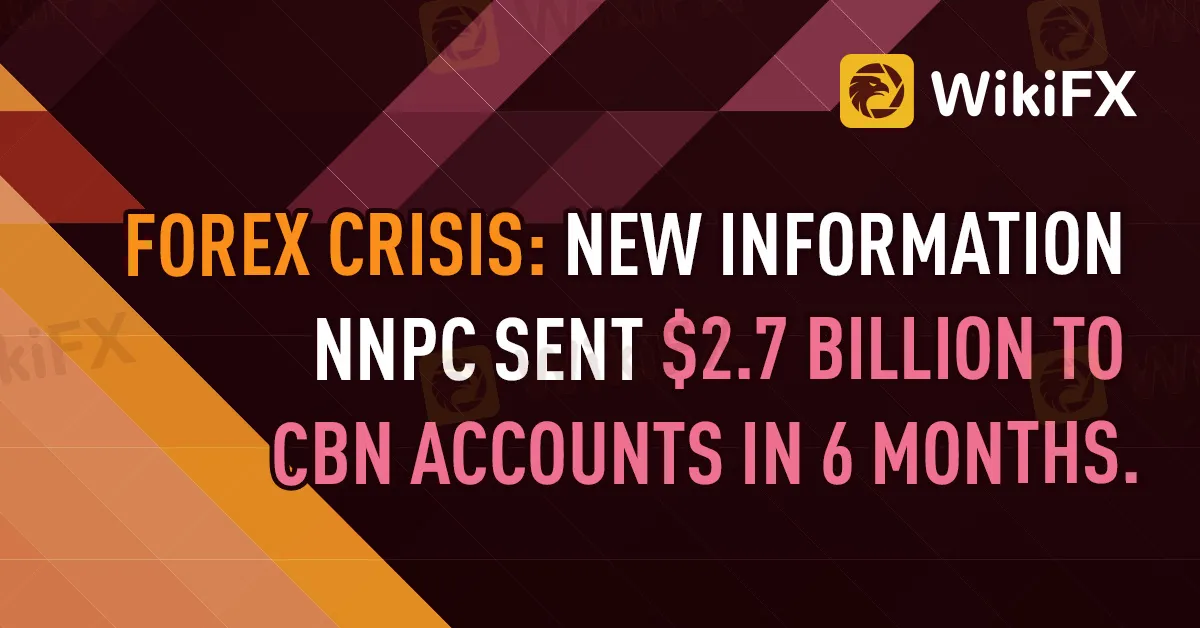简体中文
繁體中文
English
Pусский
日本語
ภาษาไทย
Tiếng Việt
Bahasa Indonesia
Español
हिन्दी
Filippiiniläinen
Français
Deutsch
Português
Türkçe
한국어
العربية
FOREX CRISIS: NEW INFORMATION NNPC SENT $2.7 BILLION TO CBN ACCOUNTS IN 6 MONTHS.
Abstract:Fresh information has shown that the Nigerian National Petroleum Company Ltd. remitted a total of $2.7 billion into its accounts with the Central Bank of Nigeria (CBN) between January and June this year, contrary to CBN's claim that foreign currency remittances were nonexistent, despite the Naira's value falling to an all-time low of N710 to the dollar last week.

Fresh information has shown that the Nigerian National Petroleum Company Ltd. remitted a total of $2.7 billion into its accounts with the Central Bank of Nigeria (CBN) between January and June this year, contrary to CBN's claim that foreign currency remittances were nonexistent, despite the Naira's value falling to an all-time low of N710 to the dollar last week.
In response to the recent naira free fall, the CBN said that the NNPC's failure to remit funds had caused the forex crisis.
The CBN stated there had been “zero-dollar remittances by the NNPC to the country's foreign reserve” in a paper titled “The forex question in Nigeria: Fact sheet.”
However, investigations have revealed that in the first half of this year, the NNPC Ltd. transferred $2.7 billion to the CBN. Records that were readily available also revealed that of the $2.7 billion that the NNPC transferred into its CBN accounts, $645 million was for a dividend paid by the Nigerian Liquefied Natural Gas Company Ltd., and the remaining $1.786 billion was for NNPC operations expenses.
According to a breakdown of the NNPC remittances, the following amounts were deposited in 2022: $18,770,418.97 in January, $194,563,276.49 in February, and $373,232,875.20 in March (March 2022).
Other NNPC payments included $247,884,295.52, $591,565,425.41, and $880,906,761.81 (all for April 2022). (June 2022).
Following the depreciation of the naira, CBN Governor Godwin Emefiele has been in the the controversy.
Emefiele was called before the Senate on Wednesday to provide an explanation for the declining value of the naira and to suggest a course of action.
In response to Senator Olubunmi Adetunmbi, the Senate not only called the head of the CBN to appear before it, but also instructed its Committee on Banking, Insurance, and Other Financial Institutions to carefully examine the intervention funds the CBN set aside to support certain economic sectors.
Senator Adetumbi said that a CBN earlier prohibition on forex sales to BDC operators led to a rise in exchange rates in his motion to summon Emefiele. He claimed that only a select few gains from the import-export window created to meet the FX requirements of commercial firms.
He claims that even the Personal Travel Allowance (PTA) and Business Travel Allowance (BTA) are inaccessible since the Central Bank of Nigeria (CBN) only covers less than 20% of the overall demand for foreign exchange made by tourists and companies.
Without accepting responsibility, the CBN has been attributing the fast decline in the value of the naira to a variety of causes.
Emefiele blamed the 2018 forex crisis on the importation of goods he said could have been produced in Nigeria, which led to the suspension of forex allocation for 41 goods.
Emefiele transferred the blame on Bureau De Change (BDC) employees in 2021, accusing them of engaging in illicit forex trading. He blamed “Aboki FX,” claiming that its operations reduced funding to BDC by causing the naira to depreciate.
The CBN has attributed the currency problem this year on politicians, money launderers who are purportedly supporting terrorists, but none of them have been able to stabilize the value of the naira.

Disclaimer:
The views in this article only represent the author's personal views, and do not constitute investment advice on this platform. This platform does not guarantee the accuracy, completeness and timeliness of the information in the article, and will not be liable for any loss caused by the use of or reliance on the information in the article.
Read more

Italian Regulator Warns Against 5 Websites
The Italian regulator, CONSOB has issued a warning against five websites offering unauthorized financial services. This regulatory action aims to protect the public from fraudulent activities.

Trader Exposes Unethical Practices by STP Trading
A recent allegation against STP Trading has cast doubt on the firm's business practices, highlighting the potential risks faced by retail traders in an increasingly crowded and competitive market.

What Makes Cross-Border Payments Easier Than Ever?
Cross-border payments are now faster, cheaper, and simpler! Explore fintech, blockchain, and smart solutions to overcome costs, delays, and global payment hurdles.

FCA Identifies Clone Firm Exploiting Admiral Markets' Credibility
The UK Financial Conduct Authority (FCA) has issued a public warning regarding a fraudulent entity impersonating Admiral Markets, a legitimate and authorised trading firm. The clone firm, operating under the name Admiral EU Brokers and the domain Admiraleubrokerz.com, has been falsely presenting itself as an FCA-authorised business.
WikiFX Broker
Latest News
Hackers Charged for $11M Crypto Theft Using SIM-Swaps
Role of Central Banks in the FX Market
FCA Alerts Against Sydney FX
What Makes Cross-Border Payments Easier Than Ever?
Trader Exposes Unethical Practices by STP Trading
Malaysian Man Loses RM113,000 in Foreign Currency Investment Scam
Bitcoin Nears $100,000: A Triumph of Optimism or a Warning Sign?
Mastercard Partners with JPMorgan for B2B Cross-Border Payments
FCA Identifies Clone Firm Exploiting Admiral Markets' Credibility
Coinbase Under Scrutiny Amid Wrapped Bitcoin Delisting Controversy
Currency Calculator


